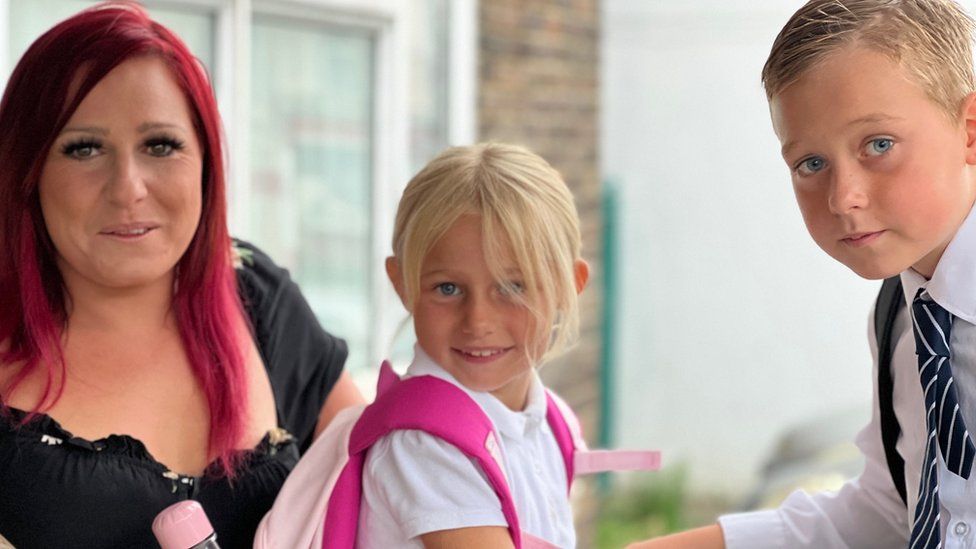School absences: The school picking kids up from home to boost attendance
- Published

The number of children missing school in England is a crisis that needs to be tackled with bigger, bolder national measures, MPs say.
The proportion of pupils who have been missing a significant amount of their education is about double the levels seen before the pandemic.
Figures for the 2022-23 academic year show 22.3% of pupils were "persistently absent", which is defined as missing 10% or more of their lessons.
In years before the pandemic, the rate was between 10 and 12%. In the last academic year it was 17.2% in primary schools and 28.3% in secondary schools.
A new report by the Commons Education Select Committee warns mental-health problems and cost-of-living pressures on families are among the complex reasons.
Parents and schools in Folkestone, Kent, where absence is higher than the national average, tell BBC News why they are struggling.
'Mentally draining'
Kelsey and her two children, Leo and Roxanne, were evicted from their home last autumn.
The family was rehoused in a flat two bus rides and at least 40 minutes from their primary school - and as Kelsey tried to stabilise their life, her mental health deteriorated.
"It was hard, mentally draining, physically draining, like you don't want to get out of bed," she says.
"You feel like you're not good enough for your children."
Kelsey's depression meant she was sometimes unable to get the children to school.
At first, she was too embarrassed to admit she was struggling. But the school kept asking why Leo and Roxanne were absent - and then began sending a minibus to collect and drop them off when Kelsey was having particularly bad days.
The Turner Schools Trust then found places for the children at a school nearer to their new home - and this term, Leo and Roxanne have been in every day.
"It's made a massive difference," Kelsey says. "It gave me more spirit, just from accepting the help."
And she now looks forward to hearing about the children's day and can walk them to school, knowing there is someone she can ask for help if she needs it.
The school's family liaison worker, Hayley Prescott, whose job includes picking up and dropping off children at risk of missing school, says it takes a while to build trust when families are in crises like Kelsey's.
"We've had a lot of families in the situation where they're going to be evicted, or placed in temporary accommodation - a bedroom with a sink, with a toilet down the corridor," she says.
The Education Select Committee report says the kind of intensive support Kelsey has received should be more widespread.
Robin Walker, who chairs the committee, says missing school can damage "children's education, their development, [and] future prospects".
The report says a pilot scheme for attendance mentors, who help families get children to school, should be expanded. Currently, schools such as the ones I visited in in Folkestone are managing out of their own budget.
The Turner Schools Trust has created a full-time post, with a senior member of staff helping pupils who have missed a lot of school reintegrate.
They include Ava, who has just started Year 10 and is on a two-year waiting list to be assessed for autism.
Her "overwhelming" anxiety meant she missed almost 17 months of primary school and then struggled to start secondary during the pandemic.
But she says having one person she can go to for support has helped her get back into school every day.
Her mother, Ruth, is very proud of what Ava has achieved with the help of the school.
"[The school] have gone above and beyond to do things for Ava - and here we are, she's now coming in full time," Ruth says.
"She's put a huge amount of effort in - she's a credit to me and to the school."
The report calls for a series of other measures, including:
- allowing children with serious mental-health problems to miss school without it being recorded as unauthorised absence
- ending the "postcode lottery" of fines for parents for unauthorised absences
- a review of whether more children should have free school meals
- clear advice for parents on when sick children need to stay home
- accelerating plans to improve support for pupils with special educational needs and disabilities
Cost-of-living pressures are making it harder for families to afford uniform, transport and food - all of which can become barriers to children attending school, it adds.
Turner Schools Trust chief executive Seamus Murphy says his schools are seeing more "deep poverty" than ever.
Last year, they distributed 200 Christmas-dinner food boxes to pupils and their families - and he is already planning for 500 this December.
There needs to be a better understanding of the impact of poverty, Mr Murphy says, to avoid a "lost generation" of children missing out on education.
"If you are living in rat-infested accommodation, you are struggling to sleep, you are sharing your room with siblings and aren't able to do homework, you are hungry, you are walking rather than taking the bus to school - all of those are headwinds for the poorest children to come to school," he adds.
A Department for Education spokesperson said the vast majority of children were now in school but it remained focused on ensuring no child falls through the cracks.
It said: "We recently announced an expansion to our attendance hubs and mentors programme and we are also working closely with schools, trusts, governing bodies and local authorities to identify pupils in need of additional support."
- Published3 September 2023
- Published16 May 2023
- Published23 February 2023
- Published30 September 2022